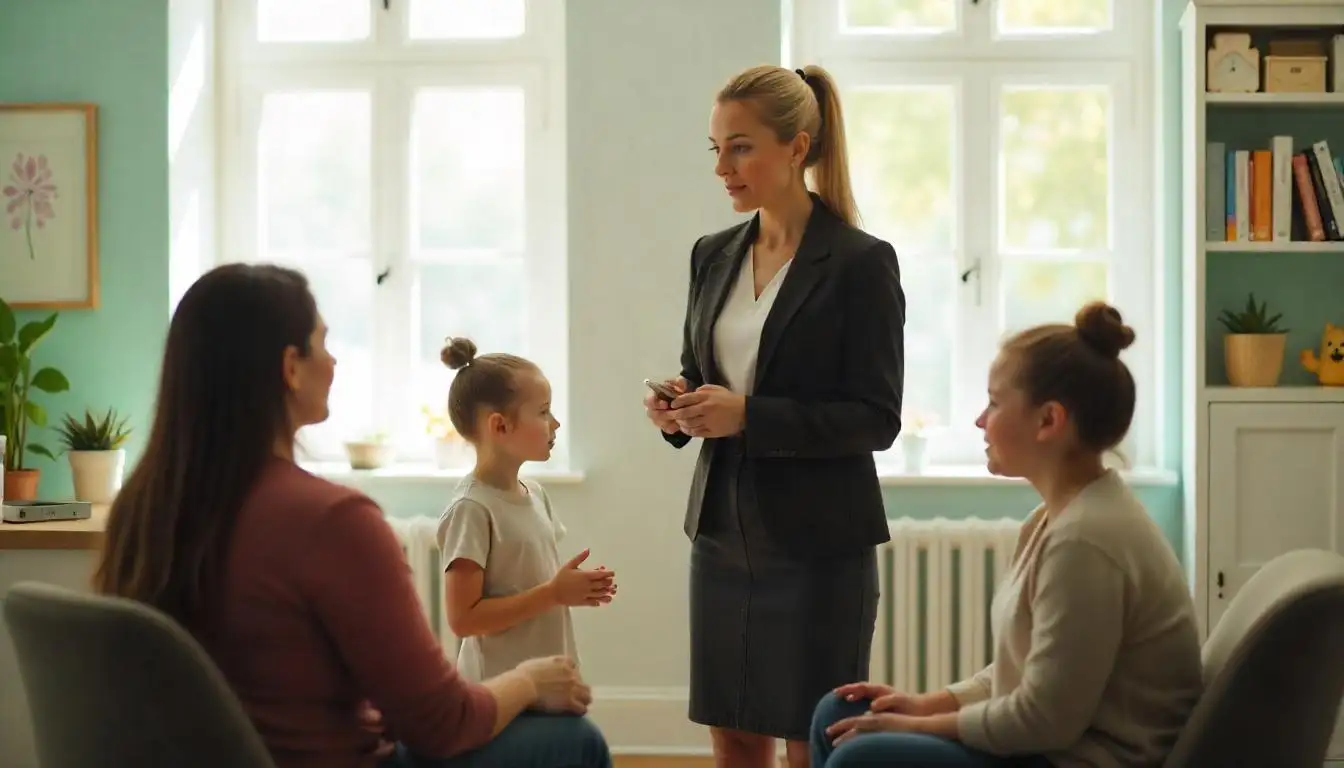A Practical Guide for NSW Parents Managing Separation and Co-Parenting
By Lyon Legal Services – Family Law & Parenting Coordination for Northern NSW
Introduction: Why Parental Conflict Hurts Children Most
In the midst of divorce or separation, it’s easy for emotions to run high. Disagreements over parenting, property, or finances can escalate—sometimes unintentionally spilling over in front of the children. But when children are exposed to conflict between their parents, they often experience long-lasting emotional distress.
In New South Wales (NSW), family law recognises the importance of shielding children from harm, including the psychological harm that can come from high-conflict parenting environments. This blog post explores the critical importance of keeping your child out of the middle and offers legally-informed, emotionally-intelligent strategies to achieve that—backed by expert advice and real-life insight from our experience working with Northern NSW families.
Child-Focused Parenting Solutions – Contact Us Now
Why It Matters: The Impact of Conflict on Children
✅ Emotional Development
Children exposed to parental conflict are more likely to suffer from:
-
Anxiety, depression, and emotional dysregulation
-
Sleep disorders and physical health issues
-
Declining academic performance
-
Low self-esteem and self-blame
-
Long-term issues with trust and relationships
Even in the absence of physical abuse, emotional exposure to arguments, manipulation, or tension can have serious psychological effects.
✅ Legal Context in NSW
Under Section 60CC of the Family Law Act 1975, a child’s best interests are the paramount consideration in family law decisions. One of the two primary considerations is:
“The need to protect the child from physical or psychological harm from being subjected to, or exposed to, abuse, neglect or family violence.”
This includes exposure to parental conflict, especially in high-conflict separation or divorce cases.
Child-Focused Parenting Solutions – Contact Us Now
1. Don’t Use Your Child as a Messenger
Using your child to relay messages—like “Tell your mum I’ll be late” or “Ask your dad if he paid the school fees”—puts your child in a psychologically compromised position. Even if the message is neutral, the emotional burden is not.
Alternatives:
-
Use email, co-parenting apps like OurFamilyWizard, MyMob, or TalkingParents
-
Create a Parenting Communication Plan to avoid misunderstandings
-
Engage a family lawyer or parenting coordinator if communication is difficult
2. Avoid Negative Talk About the Other Parent
Children are naturally loyal to both parents. When you criticise your co-parent, your child hears it as an attack on a part of themselves.
❌ “Your mum is always selfish.”
✅ “We’re figuring things out. It’s not your fault.”
Even subtle undermining, sarcasm, or eye-rolling in front of the child sends harmful messages. Over time, these can damage the child’s relationship with one or both parents and contribute to Parental Alienation Syndrome.
3. Respect Your Parenting Plan or Court Orders
Consistency, predictability, and structure are essential for a child’s emotional security. Breaching parenting orders or making last-minute changes creates instability.
Examples of harmful behaviours:
-
Withholding the child as punishment
-
Showing up late or not at all for changeovers
-
Unilaterally changing holiday arrangements
✅ Legal Tip:
If the current arrangement is no longer working, consult a family lawyer in NSW to apply for a variation order or to attend Family Dispute Resolution (FDR).
Child-Focused Parenting Solutions – Contact Us Now
4. Avoid Making Your Child Choose Sides
Asking questions like “Wouldn’t you rather live with me?” or “Don’t you think I’m more fun than Dad?” places a child in an impossible position. It breeds guilt, anxiety, and identity conflict.
Let the child know:
;“We are both here for you. You don’t have to pick sides.”
“We’ll make adult decisions together—you just get to be a kid.”
5. Protect Changeovers from Conflict
Drop-offs and pick-ups are common flashpoints. Children can become highly distressed if they anticipate arguments between their parents.
Strategies:
-
Choose neutral public locations
-
Keep greetings civil, short, and non-confrontational
-
Use supervised changeovers or a third party if necessary
-
Consider changeover support via Contact Centres in NSW
Child-Focused Parenting Solutions – Contact Us Now
6. Reinforce Your Child’s Relationship with the Other Parent
Research consistently shows that children do best when they maintain strong, healthy relationships with both parents. Unless there is abuse or danger, fostering this relationship helps children feel secure, loved, and valued.
✅ Encourage shared experiences:
-
Speak positively about the other parent’s time (“I bet you had fun at the beach with Mum!”)
-
Display photos from both households
-
Support your child’s communication with the other parent (calls, texts, letters)
7. Create a “Safe Zone” for Emotional Expression
Children often suppress their feelings to protect their parents or to avoid escalating tensions. Encourage open emotional dialogue by saying:
“You can talk to me about anything. I won’t be upset.”
“It’s okay to miss Dad when you’re with me.”
“Feeling sad or angry doesn’t mean you’re bad—it just means you’re human.”
Consider involving:
-
Child psychologists or school counsellors
-
Play therapy for younger children
-
Child-Inclusive Mediation (CIM) when developing parenting arrangements
8. Stick to Routine and Structure Across Households
Inconsistent rules and expectations can confuse children and make them feel insecure. Try to align basic routines between both homes to provide predictability.
✏️ Co-parenting checklist:
-
Bedtimes and wake times
-
Meal routines and nutrition
-
School and homework expectations
-
Screen time and discipline boundaries
Use shared digital calendars to coordinate activities, school events, and medical appointments.
9. Avoid Financial Discussions in Front of Your Child
Whether it’s child support, school fees, or extracurricular costs—keep the financial talk away from your child. When they hear “I can’t afford it because your dad won’t pay,” children may feel guilty, ashamed, or caught in the crossfire.
Speak with a lawyer or financial advisor to formalise support agreements. NSW Legal Aid also offers support on child support disputes.
10. Use Parenting Coordination in High-Conflict Situations
What is Parenting Coordination?
Parenting Coordination is a structured, child-focused process where a qualified neutral professional helps co-parents:
-
Implement parenting plans or court orders
-
Resolve disputes without court
-
Reduce communication breakdown
-
Focus on the best interests of the child
Parenting coordination is especially useful for:
-
High-conflict families
-
Repetitive disagreements about minor issues
-
Parents with communication challenges
-
Complex family dynamics
At Lyon Legal Services, our trained parenting coordinators help families across Northern NSW, including Lismore, Byron Bay, Tweed Heads, and surrounding regions, navigate parenting challenges with clarity and compassion.
11. Practise Self-Regulation and Emotion;al Awareness
Children mirror the emotional tone of their environment. The calmer and more regulated you are, the safer your child feels.
♀️ Try:
-
Mindfulness and breathing exercises
-
Journaling to process anger privately
-
Speaking with a family therapist or counsellor
-
Taking breaks before responding to heated communication
12. Don’t Involve Children in Adult Decision-Making
From asking for advice about legal issues to oversharing details about why the relationship ended, children shouldn’t be burdened with adult concerns. Let your child enjoy their childhood.
Instead of:
“Do you think I should go back to court?”
Say:
“Mum and Dad are working things out in a way that’s best for you.”
13. Respect Your Child’s Privacy
Children may not want to discuss their experiences at the other parent’s house. Refrain from interrogating or trying to extract information. Trust and privacy go a long way in building emotional resilience.
❌ “What did she feed you? Was he there?”
✅ “I hope you had a great time. Anything you want to share?”
14. Co-Parent as a Team—Even If You’re Not Friends
You don’t need to be friends with your ex to be effective co-parents. You do need to:
-
Share information
-
Make joint decisions where required
-
Maintain a tone of respect and neutrality
-
Keep your child’s wellbeing as the shared top priority
Legal Help and Family Services in NSW
If you’re struggling with parenting conflict or need guidance on how to protect your child legally and emotionally, here are some resources:
Supportive Services:
-
Lyon Legal Services – Parenting coordination, family law, and mediation
-
Family Relationships Online – www.familyrelationships.gov.au
-
Legal Aid NSW – www.legalaid.nsw.gov.au
-
Relationships Australia NSW – Counselling and FDR services
-
Kids Helpline – 1800 55 1800 (for children and teens)
Conclusion: Your Child’s Emotional Safety Comes First
You can’t control every aspect of your co-parent’s behaviour, but you can control how you respond, what you model, and how you support your child. Keeping your child out of the middle doesn’t mean pretending everything’s perfect—it means being intentional, calm, and child-focused in your parenting choices.
With the right legal support, emotional strategies, and tools, you can create a peaceful, structured environment that allows your child to grow in confidence, security, and love—even through separation.
✅ Need Help Creating a Child-Focused Parenting Plan?
At Lyon Legal Services, we work with families across Northern NSW to:
-
Implement low-conflict parenting plans
-
Facilitate parenting coordination in difficult situations
-
Advocate for your child’s best interests in and out of court
Whether you need help negotiating parenting arrangements, applying for orders, or just want to understand your rights—we’re here to guide you with empathy and legal expertise.


















